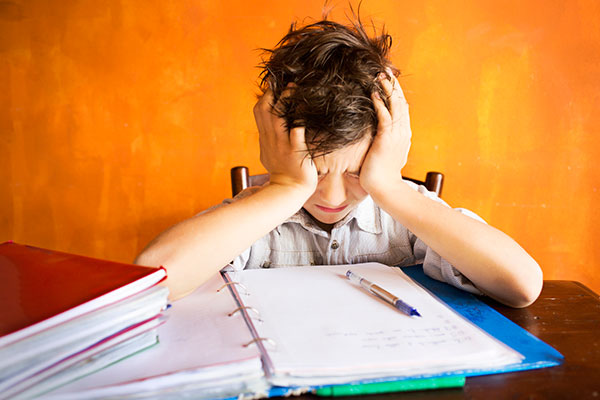Kids and Stress: a Parents Guide
Is your child moping about? Has her appetite decreased? Is she complaining about an upset stomach or vague stomach pain?
If so, you may have a stressed-out child on your hands. Anxiety symptoms are common in children and adolescents. But too much stress can negatively affect your child’s health. So how can you help to reduce your child’s anxiety and stress?
Signs of Stress: From Toddlers to Teens
First of all, recognize the signs. A young child doesn’t exhibit stress in the same way as an older child. The younger your child, the less able she is to verbalize her feelings. She may become clingier, whereas a stressed teen may become (more) withdrawn.
Here are some common signs of stress from the National Child Traumatic Stress Network:
Kids ages 5 to 6:
- Sleep disruption
- Withdrawal
- Intense separation anxiety
- Inconsolability
- Increased aggression
Kids ages 6 to 11:
- Nightmares
- Aggression
- Difficulty with peers
- Flat emotions
- School avoidance
Kids ages 12 to 18
- Antisocial behavior
- Academic failure
- Self-harm
- Substance abuse
- Depression
- Withdrawal
- Argumentativeness
How Parents Can Help
As a parent, you can’t protect your kids from stress — but you can help them develop healthy ways to cope with stress and solve everyday problems. The American Psychological Association recommends the following tips:
- Be there. Make yourself available to “just listen” when they’re most relaxed and open to conversation—often at bedtime, in the car, or before dinner.
- Pay attention. Give your kids your full attention when they’re ready to talk. No multitasking!
- Be patient. Hear them out fully before you respond. Don’t interrupt them midsentence or start immediately offering “quick fixes.”
- Keep the focus on their feelings, not on your feelings or reactions.
- Don’t react negatively. Don’t get angry or defensive if they say something that “pushes your buttons.”
- Encourage them, through your gentle questions and responses, to share the full story. Remember that kids will often “test the waters” by telling you just a small part of the story first.
Keep in mind that there’s no one stress management solution that works for every child. Each child is unique. If you think that your child is suffering from an anxiety disorder or experiencing a high level of stress or you need the help of a therapist, please call your child’s doctor.
Additional Resources:
- Anxiety Disorders Association of America: www.adaa.org
- OCD Foundation: www.ocfoundation.org
- Child Anxiety Network: http://www.childanxiety.net/
- Anxiety Social Net: http://www.anxietysocialnet.com/



